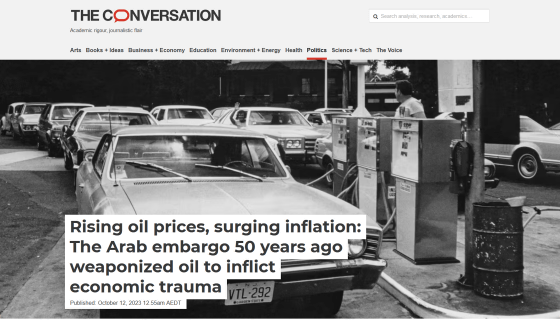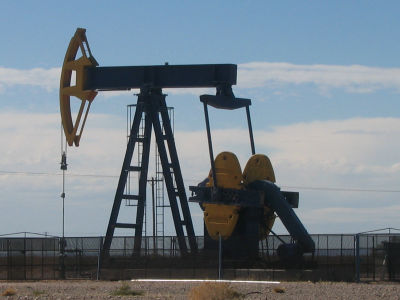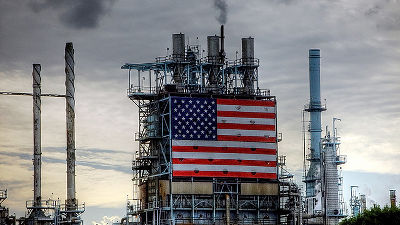What impact did the oil crisis of the 1970s have on the world economy and the oil industry?

October 16-17, 1973: In response to the United States' support for Israel in
Rising oil prices, surging inflation: The Arab embargo 50 years ago weaponized oil to inflict economic trauma
https://theconversation.com/rising-oil-prices-surging-inflation-the-arab-embargo-50-years-ago-weaponized-oil-to-inflict-economic-trauma-214670

The Yom Kippur War that broke out in 1973 broke out between Israel and Arab countries including Egypt and Syria over territory that Israel had occupied six years earlier in the Yom Kippur War in 1967. It was a war. At the beginning of the war, the Arab side pushed the Israeli side, which led to the conclusion of the Egypt-Israel peace treaty and the return of the Sinai Peninsula to Egypt.
During the Yom Kippur War, King Faisal of Saudi Arabia made an agreement with the leaders of Egypt and Syria, stating that ``If the United States intervenes to support Israel, we will retaliate with oil as a weapon.'' I had decided. After that, as the United States supported Israel, Saudi Arabia and OPEC member countries raised oil prices, reduced production, and implemented oil embargoes on countries that supported Israel such as the United States and the Netherlands.
The resulting oil shock had a major impact on the world oil market and economy. Looking at the graph below showing the trend of crude oil prices, you can see that it jumped as soon as OPEC sanctions began in 1973, and the price did not return to the previous level for more than 10 years after that.

OPEC's oil price hikes and oil embargoes were successful because at the time, OPEC had a major advantage in world oil production and oil accounted for a high proportion of energy sources. Before the oil crisis, approximately half of the total energy used in the United States and the world was fueled by oil, and OPEC member countries produced 53%, or more than half, of the world's oil. Therefore, Mr. Crane and others point out that OPEC sanctions worked well.
Also, during the oil crisis, oil producing countries shut out Western oil companies, and many oil producing countries regained sovereignty over their own oil reserves. As a result, a huge amount of oil money flowed into Middle Eastern countries, which at the time were still building infrastructure such as electricity. In particular, Saudi Arabia's oil revenue was 655 million dollars (approximately 240 billion yen at the exchange rate at the time) in 1965, but in 1975 it increased approximately 40 times to 26.7 billion dollars (approximately 8 trillion yen at the exchange rate at the time). yen), leading to the rise in geopolitical power of Middle Eastern countries.
Rising oil prices wreaked havoc on the then-more fragile and inefficient economy and transportation system than today's, and

Additionally, oil companies from Western countries forced out of oil-producing countries in the Middle East have expanded into areas where it is more difficult to extract crude oil, such as the Gulf of Mexico, the North Sea, and northern Alaska. As a result, world oil production has diversified, which in turn has weakened the influence of Middle Eastern countries in oil production.
The graph below shows OPEC's share of world oil production in red and oil's share of world energy demand in yellow. At the time of the oil shock in 1973, OPEC's share of oil production was more than half, 53%, but after that it gradually decreased and remained at 36% at the time of article creation. Rising oil prices have also created incentives to develop alternative fuels, reducing the share of oil in energy sources.

The graph below shows the oil production volume of the United States in blue and the oil production volume of Middle Eastern countries in red. The United States became one of the world's leading oil exporting countries in the late 2000s with the shale gas revolution that made it possible to extract oil and natural gas from shale formations , which had previously been difficult.

At the time of writing, 50 years have passed since the oil crisis, energy remains an important topic for national security. Russia's invasion of Ukraine in 2022 had a major economic impact as Russia halted natural gas exports to Europe. In October 2023, Hamas, the terrorist organization that effectively controls Palestine, launches a large-scale attack on Israel, sparking a military conflict, and there are concerns about its impact on the oil market.
On the other hand, energy security itself is undergoing major changes, with progress being made in recent years in the development of renewable energy sources such as wind and solar power. This shift to non-oil energy sources insulates consumers from the supply chain risks of oil price fluctuations. 'Changes in global energy ratios, particularly the rapid spread of electric vehicles, could weaken the importance of oil and the cartels that oversee it,' Crane et al. said.
Related Posts:
in Note, Posted by log1h_ik







